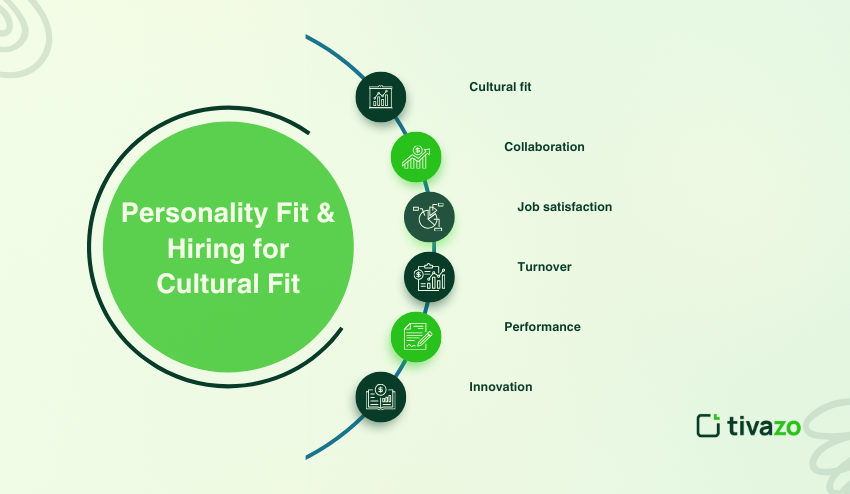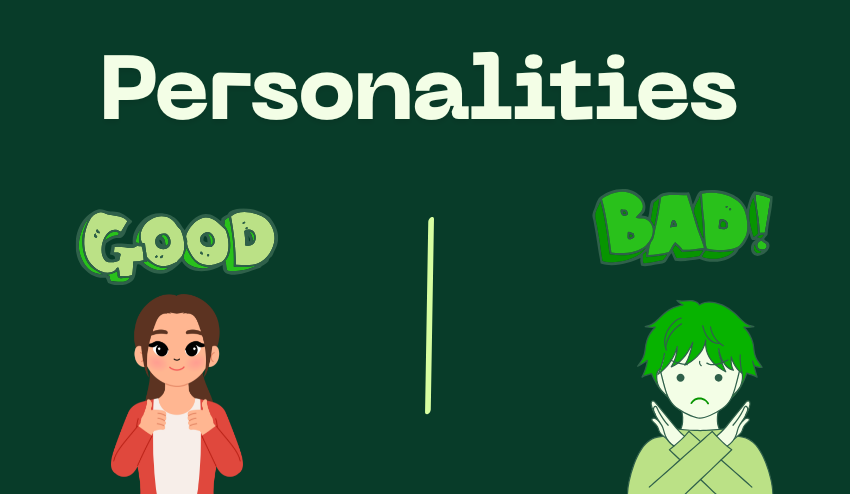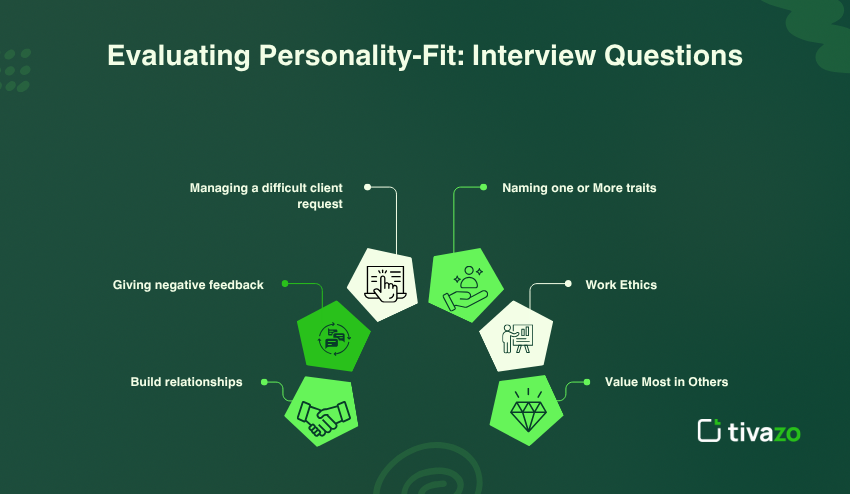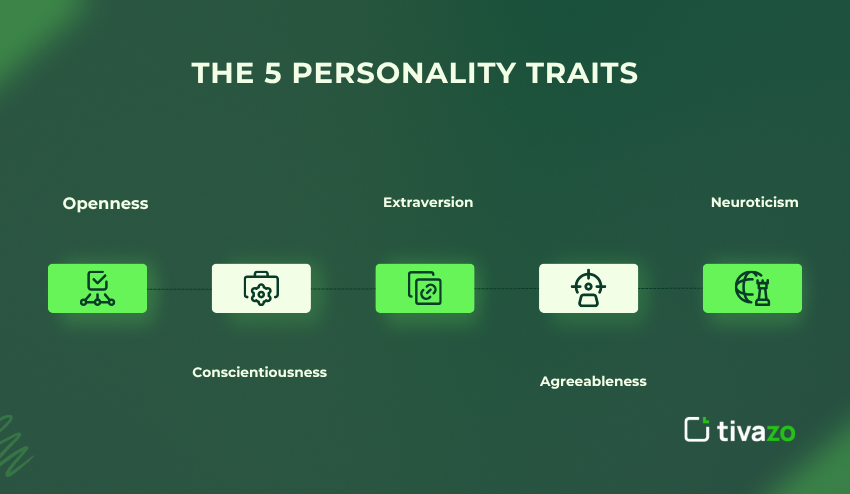Choosing the right person goes much deeper than verifying skills and experience; it is about understanding who they are. Personality interview questions can uncover a candidate’s traits, values, and behaviors so you can assess if they will fit in with your team and company culture. In this guide, you will learn about what personality is, why it matters in hiring, and how to evaluate personality fit, and I’ll give you ready-to-fill-in-the-blank questions to help you be confident, informed, and capable in your hiring decisions.
Key Highlights:
- What is Personality?
- Personality Fit & Hiring for Cultural Fit
- Why Use Personality Questions in an Interview?
- Do You Need to Evaluate for “Good” and “Bad” Personalities?
- Evaluating Personality-Fit: Interview Questions
- Top 5 Behavioral Interview Questions
- The 5 Personality Traits
- What Is a “5 STAR” Question in a Job Interview?
What is Personality?
Personality is the traits, values, and behaviors that define how an individual thinks, feels, and interacts with others. Personality impacts how a candidate adapts, collaborates, problem-solves, and develops, all of which are relevant considerations in the workplace.
Personality is often formed through an amalgamation of genetics, lived experience, environment, and choice. Personality affects how we face difficulties, work with others, and accept success and failure. In a work environment, personality may influence how we communicate, how we deal with conflict, and whether we deal with change and chaos positively or negatively.
An extroverted person might enjoy a fast-paced working environment where collaboration is important, while an introvert may prefer to work with a lot of detail and focus. Understanding personality interview questions is more than mere content labels; it involves identifying areas of strength, as well as potential areas for development, and understanding how those strengths and areas for growth align with the objectives of an organization. All this knowledge informs our framework for building successful, cohesive teams that are aligned on vision and values.
Why Use Personality Questions in an Interview?
Personality interview questions in the interview process provide you with many benefits
- To help you gain additional context into a candidate’s self-awareness, flexibility, and people skills.
- To see how candidates typically act under pressure, in times of conflict, or in stressful situations.
- To gauge the candidate’s cultural fit by identifying how well they align with your values, mission, and way of working.
- To uncover the candidate’s underlying motivation and working style beyond what the candidate presents on a resume.
- To help you predict a candidate’s long-term success by identifying the soft skills necessary to work as part of a team.
- To minimize hiring risk by selecting candidates whose skills and personality match the role.
- To help you evaluate emotional intelligence, which contributes to their communication and problem-solving abilities.
- To improve retention by finding candidates who are likely to flourish in your organizational culture.
Personality Fit & Hiring for Cultural Fit
Ensuring a personality interview questions fit refers to aligning a candidate’s characteristics with the typical cultural and behavioural requirements of a job role. For example, if an organization can match someone’s thinking style, motivation, and interpersonal expectations with the organization, there will be better teamwork, morale, and retention.
Few reasons why personality fit matters:
- Cultural fit – Employees who demonstrate the organization’s values tend to integrate more quickly and smoothly into the work environment.
- Collaboration – Team performance runs more smoothly when team members are complementary in their personality; each member can consider the other’s strengths and weaknesses.
- Job satisfaction –When personality fits with the job role, employees report more job engagement, motivation, and fulfilment.
- Turnover – A proper personality interview questions fit reduces the possibility of unmet expectations, which typically leads to long tenure.
- Performance – People are more naturally performant when they are operating in the environment of their respective personality style.
- Innovation – Multiple personality styles that are distinct but compatible can stimulate creativity while moderating needless friction.

Do You Need to Evaluate for “Good” and “Bad” Personalities?
To define a person’s personality interview questions as purely “good” or “bad” is extremely reductive to human behaviours, and we lose valuable opportunities. For example, the “good” traits of collaboration, compassion, and resilience are classified as “good” because they are aligned with cooperation. Depending on the job role, having defined levels of collaboration may not always be the best for decision-making, or a role that requires significant independence (which could be rapidly changing).
Similarly, “bad” personality traits, like the perfectionist, harsh critic, can be seen as a strength in roles centred around accuracy, detail orientation, quality assurance, etc., or there may be roles where some skepticism could help in risk-based positions.
What is essential is to distinguish the context of the job and the team. Ensuring there is a balance of traits from the hiring manager, which are aligned with the role and culture of the business, should be the goal, not determining if a person is “good” or “bad.” This thoughtfulness allows for decision-making towards building diverse teams with personalities who complement each other and contribute to a successful team as a whole.

Evaluating Personality-Fit: Interview Questions
- “Please name one or more traits that you wish you could change about yourself.”
- “How would you describe your work ethic?”
- “What traits do you value most in others and why?”
- “How easy do you find it to build relationships?”
- “How do you give negative feedback?”
- “Talk about when you had to manage a difficult client request.”
These personality interview questions will reveal self-awareness, interpersonal style, integrity, and values.

Top 5 Behavioral Interview Questions
Behavioral personality interview questions aim to assess how candidates have acted in actual situations in the past. This is because past behavior is most often the best indicator of future performance. Behavioral questions can provide a lot of insight into how a candidate is likely to operate in similar situations that might arise at your organization.
Here are five great behavioral interview questions and why they are useful to ask:
1. Tell me about a time when you failed.
This personality interview questions assesses the emotional, cognitive, and motivational aspects of a candidate’s self-reflection and learning from their mistakes. Candidates who address failure openly, with some type of resilience and accountability, show a higher level of maturity and growth mindset – both of which we certainly hope to foster in dynamic workplaces.
2. Describe a time that you resolved a conflict with a difficult stakeholder.
Conflict in team environments is inevitable, and conflict resolution is essential. The conflict might be openly obvious and in need of action, or it might be quietly brewing under the surface. This question assesses many dimensions of a candidate’s emotional intelligence, diplomacy, and overall communication skills, and how well they can navigate tough conversations while maintaining professionalism.
3. When you think back to working under pressure or tight deadlines, please give me one example
An example relating to high-pressure situations or tight deadlines can show how a candidate approaches time management and shows us how they react in stressful situations when confronted with a tight timeline for problem-solving. A complete response will give you some insight into whether a candidate might lose their cool under high-pressure circumstances and whether they prioritize tasks appropriately, as well. Quality of results in high-pressure situations often counts for more than how fast you can get it done. This is also another way of a personality interview questions.
4. Share a challenge you have converted to a learning opportunity
This question explores self-awareness and initiative. It’s great to see candidates learning from failures and leveraging those failures for improvement, as continuous improvement is a critical factor in long-term success.
5. Explain how you like to receive feedback and why
Being able to receive feedback is crucial for personal growth and teamwork. This question helps to understand candidates’ openness to constructive criticism, communication preferences, and willingness to improve.
When combined, these behavioral questions provide a robust, realistic understanding of a candidate’s work style from these personality interview questions that can support more informed hiring decisions.
Examples of Personality Interview Questions for Managers
Here are some of the best personality interview questions for managers to evaluate key leadership traits:
1. How do you handle conflicts within your team?
This question assesses conflict resolution skills, emotional intelligence, and problem-solving approach.
2. Can you describe a situation where you had to motivate a team during a challenging project?
Evaluates leadership style, motivation techniques, and the ability to inspire others.
3. How do you adapt your management style to different team members?
Tests flexibility, interpersonal skills, and understanding of individual strengths.
4. What is your approach to giving constructive feedback?
Reveals communication skills, empathy, and the ability to foster professional growth.
5. Tell me about a decision you made that was unpopular with your team. How did you handle it?
Highlights decision-making skills, accountability, and transparency in leadership.
Tips for Conducting a Personality Interview for Managers
- Use open-ended questions: Encourage candidates to share detailed examples rather than simple yes/no answers.
- Assess emotional intelligence: Look for self-awareness, empathy, and social skills.
- Observe communication style: Pay attention to clarity, tone, and approachability.
- Consider cultural fit: Ensure the candidate’s values align with the organization’s vision and team dynamics.
Examples of Tricky Personality Questions
1. If you could change one thing about your last manager, what would it be?
Assesses honesty, tact, and critical thinking without being negative.
2. How would you describe yourself in three words your colleagues might disagree with?
Tests self-awareness and ability to handle constructive criticism.
3. If you had to choose between meeting a deadline and maintaining quality, which would you prioritize?
Evaluates decision-making, priorities, and ethical judgment.
4. Describe a situation where you failed and how you handled it.
Assesses accountability, resilience, and growth mindset.
5. How would you handle a team member who consistently disagrees with your ideas?
Reveals conflict resolution skills, empathy, and leadership approach.
The 5 Personality Traits
Referred to as “The Big Five”, these five core traits are important to understand as you’re evaluating candidates’ personalities based on these personality interview questions. Below you’ll find an explanation of each trait, what it shows, and its relevance to hiring:
| Trait | Description | Why It Matters in Hiring |
| Openness | Creativity/Curiosity | Candidates who score higher on openness tend to bring with them innovation and adaptability, which is valuable for any role that is highly dynamic and requires problem-solving. Assessing openness based on personality interview questions can help you find an employee who is going to thrive in a changing environment. |
| Conscientiousness | Discipline/organization | Conscientiousness is a trait that indicates reliability and a strong work ethic. Candidates who score higher on conscientiousness tend to be detail-oriented in their work and responsible – these are all key characteristics needed for a role that requires precision. Asking personality interview questions will help you reveal how conscientious a candidate is. |
| Extraversion | Sociability/assertiveness | Candidates who are extraverted are often also skilled team members and potentially leaders. Personality interview questions can illuminate how comfortable a candidate may be with collaboration and client-facing roles. |
| Agreeableness | Compassion/Cooperation | Candidates who are high in agreeableness are likely to demonstrate cooperative behaviours and be able to maintain positive workplace relationships – this is significant for determining culture fit – conducting personality interview questions helps to evaluate this personality trait as an indication of future team harmony |
| Neuroticism | Emotional stability vs. anxiety | Emotional stability (versus anxiety) can be a real benefit in maintaining composure in stressful conditions. Personality interview questions help in assessing whether or not a candidate can manage workplace challenges |
By implementing focused personality interview questions, hiring managers can measure the Big Five traits effectively so they can place candidates in both the right role and the right company, thereby enhancing team performance and satisfaction.

What Is a “5 STAR” Question in a Job Interview?
The “5 STAR” question is not a term specifically defined in the reference literature, as most people understand it as a combination of two very powerful interview approaches: the STAR method and the assessment of Big Five personality traits. The STAR method (situation, task, action, result) is the way for candidates to provide a structured answer to behavior-based questions, a description of the situation, what role they played, what actions they undertook, and what the outcome was related to the question.
When personality interview-type questions are used in combination with the STAR approach, hiring managers are able to assess what the candidate did and also what their personality traits exhibit about what led them to behave in a particular way and make particular decisions.
Using personality interview-type questions together with the STAR approach can provide a much deeper look into a candidate’s problem-solving, ability to manage change, ability to deal with ambiguity, and interpersonal style. The dual interviewing approach leads to greater clarity of fit for both the candidate related to the role they are seeking and the company culture, thus assisting in making improved hiring decisions.
Conclusion
These personality interview questions can help reveal traits such as flexibility, emotional intelligence, and fit to create strong teams that are cohesive and deliver value. Match behavioral approaches such as the STAR technique with the Big Five Personality Traits (extraversion, agreeableness, conscientiousness, emotional stability, and openness to experience), and you will be able to make smarter selections, improve job performance, minimize turnover, etc.
The insight gained from personality interview questions can help ensure you hire candidates with not only the right skills, but also the mindset to flourish in your environment.




